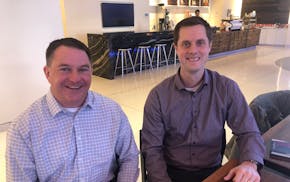The deal to buy the Regional Acceleration Center closed quietly this month, without fanfare but with purpose.
The complex, completed in 2018, signaled good jobs and an improving economy on the near North Side of Minneapolis. Thor Construction built the center and was its flagship tenant before it failed with debt and cost overruns amid lawsuits in early 2019, leaving the $14 million project in peril.
Target stepped in to help save the Regional Acceleration Center (RAC) with a long-term lease commitment and turned over Thor's former fourth-floor offices in 2020 to expanding Summit Academy, the job-training enterprise, which moved in its IT operation.
Now it has a new owner rooted in local commerce and community.
RAC tenants Build Wealth — represented by David McGee, executive director and a longtime banker and financial adviser — and Stairstep Foundation, led by CEO the Rev. Alfred Babington-Johnson, last week put down nearly $1 million on the $10 million-plus acquisition of the building.
"I'm a banker ... and we made a viable offer," McGee said. "This is a building for the community."
Thor founder Richard Copeland, 65, who started with a truck and a shovel in 1980, was raised on the North Side. He was lauded widely when he moved Thor back to the old neighborhood. A street adjacent to RAC was renamed "Copeland Way" at a ceremony last summer.
Last week's deal to sell the center was constructed by LISC Twin Cities, the nonprofit financier that is funded largely by financial institutions and foundations. It targets projects in poor neighborhoods. U.S. Bank and Old National Bank, original lenders, also were part of the transaction, according to Kate Speed, a project finance officer with LISC.
"This is a good outcome," said Peter McLaughlin, a former Hennepin County commissioner who heads the Twin Cities office of LISC.
The two buyers contributed cash equity of more than $900,000. Thor had an unspecified equity stake wiped out. And LISC is taking a $300,000 loss on its 2018 investment.
The majority of the financing comes from $10 million in new markets tax credits, which are sold to institutional investors, including $2 million to U.S. Bank. The other $8 million is being sold through Old Republic. The tax credits are used to offset tax liabilities of the investors over several years.
The RAC refinance will net $8.7 million in equity because the credits are worth less than $10 million to the buyers over the period they are used.
The RAC complex originally cost about $36 million, the lion's share for a 620-stall parking facility used mostly by the county's NorthPoint Health & Wellness. NorthPoint is being rebuilt and expanded.
The developments at Penn and Plymouth, including the new Estes Funeral Chapel, total about $100 million, the biggest investment ever on the North Side.
The RAC is the nexus of a business-community collaboration. The five-story building, including minority-business counselor-lender Metropolitan Economic Development Association (Meda), is substantially leased.
Babington-Johnson has spent decades at the intersection of the African American church network, business and community. His quest is improved spiritual, mental and financial health, training and economic opportunity, particularly for young Black people and residents of the North Side.
McGee is a veteran commercial and mortgage banker who started recruiting, training and mentoring young minority employees decades ago. Eventually, after encouragement from business associates, he started Build Wealth in 2004.
Once housed across Plymouth Avenue in the Urban League building, Build Wealth has dozens of employees and volunteers who work mostly with minority individuals and families on stabilization plans that include financial education, debt management and savings through relationships that can last up to two years.
"Ninety-eight percent of the people who come here are renters," McGee said. "Thirty-five percent leave home owners. We've helped 9,000 Black families buy homes. Very little default or foreclosure."
Build Wealth, which works with 1,200 families yearly, charges $108 annually for services that can mean thousands in savings over years. Most of its clients hail from north Minneapolis, which has high poverty and low income rates and the largest concentration of minority residents in the Twin Cities.
"We always have a waiting list," McGee said. "We provide financial and life services. We charge something because we find that people who put something in do better. People who come looking for free services, or welfare, do less well. We are not a 'faith-based' organization, but it's all over the company."
Build Wealth, which maintains a low profile that belies its successful track record, is supported by companies, foundations and individual donors.
McGee and Babington-Johnson believe progress in narrowing education, opportunity and income gaps lies in equipping minority families with financial education and coaching and partnering with employers, educators and trainers.
A goal often is to own a home, where most folks build their most significant store of long-term wealth.

St. Anthony: 'Patient' investing paying off for St. Paul's Hill Capital

Jennifer Smith, leader of Burnsville's Innovative Office Solutions, has died

St. Anthony: Medical professions in Minnesota need more people of color in their ranks



